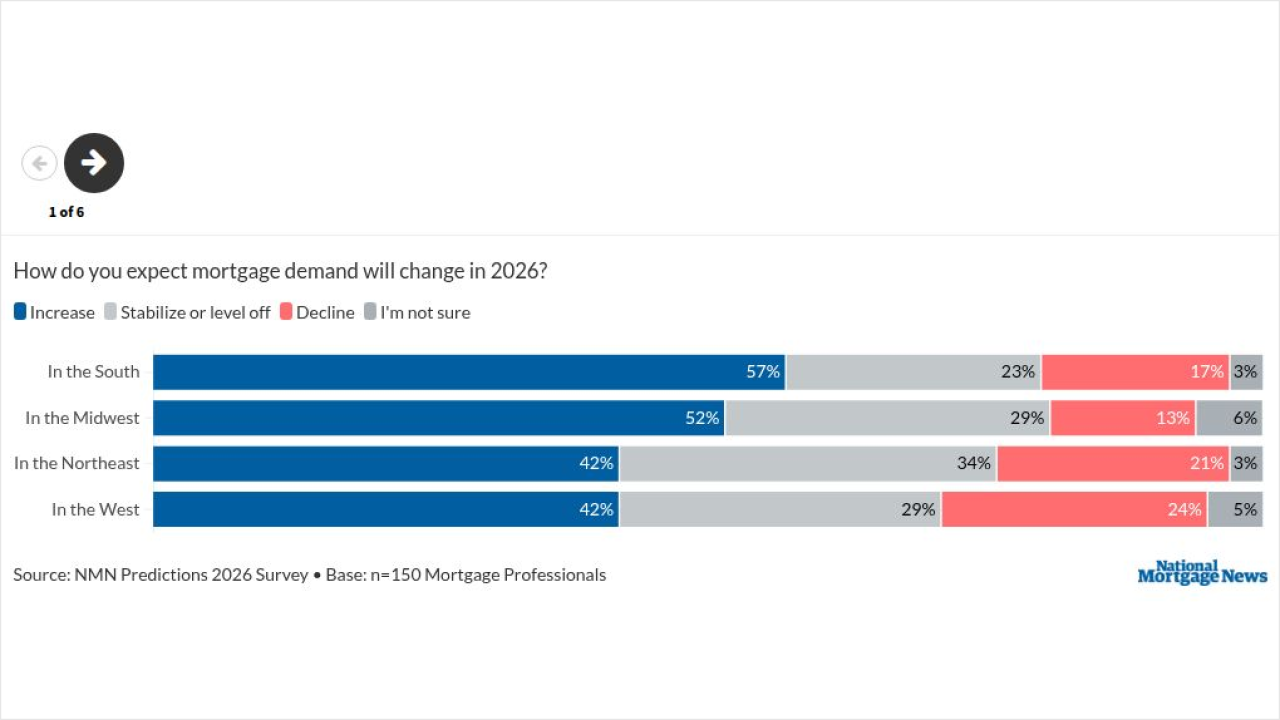Condominium and homeowner associations are on track to grow in 2024, adding to a constrained supply of housing, and making
The number is set to increase from 365,000 in 2023 to as much as 370,000 this in 2024, and they account for almost one-third of U.S. home inventory, according to a recent Foundation for Community Association Research study and forecast.
Community associations also account for a significant share of the new homes that have become a
"Approximately 67% of the homes completed in 2023 were in a homeowner's association, condominium or housing co-op. That's a big number," said Dawn Bauman, executive director of the foundation and chief strategy officer at the Community Associations Institute.
Community associations new and old now account for around 30% overall housing stock as some jurisdictions cultivate them as a way to take some of the property maintenance the public sector's responsible for in the hands of private entities.
But for lenders and investors, financing an association property has some complications compared to a traditional single-family home because underwriting has to account for additional factors like the finances of the building and potential super liens on units with unpaid fees.
In addition to that, since the notorious collapse of a Surfside, Fla., condo building, the market's been perhaps rightfully more worried about the soundness of this housing stock as it ages.
While the association component of new home construction is considerable, the total sector does also include a significant number of older buildings more than 40 years old, Bauman said.
As a result, influential government-related mortgage investors have instituted stricter rules in response to Surfside, first on
Lenders and associations haven't argued with the need for some rule changes following the collapse but have looked for improvement in communication regarding which buildings have issues that bar financing and processes available to remedy such concerns.
Those investors, Freddie Mac and Fannie Mae, have responded with plans to improve transparency for both associations and lenders.
Not only is Freddie
Fannie's plans,
While circumstances in this regard may be more copacetic this year, associations and lenders still expect some challenges.
"Fear of building structural integrity has created this environment where insurance premiums for condo buildings have skyrocketed," Bauman said. Growing disaster and climate risk also has added to this concern.
Anecdotal evidence suggests some of the hikes have been 10-fold where a building might have a $15,000 premium one year, and $150,000 the next, according to Bauman.
"Some of these condo and co-op associations are taking out loans or issuing special assessments to pay the premium. We're collecting some data on this topic so we see how widespread it is," she added
Meanwhile, a coalition of groups like the Community Home Lenders of America are reiterating a longstanding call for the Federal Housing Administration to make some automated improvements to its procedures for sharing information about condo loan issues and how to resolve them.
While the FHA by some accounts has been more transparent than Fannie and Freddie in that it has offered a public condo-search tool, its process for identifying and remedying issues has "room for improvement," said Scott Olson, executive director of the mortgage trade group.
(Although some mortgage data providers have sought more public access to Fannie and Freddie's information about which properties get their approval and which don't, the CAI prefers they be more circumspect to prevent buildings with issues from being stigmatized.)
The limitations of the FHA's technology are part of a broader concern at the Department of Housing and Urban Development, where circumstances that include its funding model often make it slower than Fannie or Freddie to make improvements to automation, Olson said.
The
"They make billions of dollars in profits for the taxpayers, and they have to come begging at hand to get minimal funding and when they have IT projects, instead of funding them up front, they've got to do it over many years. It's a crazy way to run a railroad," he said
HUD said in an emailed statement that it does have eventual plans to make "enhancements to FHA systems used for the origination of condominium mortgages" as part of a broader update.
"FHA is dedicated to modernizing its technology systems, including those used by program participants when interacting with FHA," a spokesperson for the department said. "Toward that end, in addition to modernization work already underway, we are developing a comprehensive IT modernization roadmap that will guide our future work and ensure that the FHA's technology better meets the needs of the agency and its business partners."
Meanwhile, some lenders in condo-heavy markets say originating can still be a challenge but has gotten easier.
"I'm mainly in New York City where it's almost like I'm drowning in co-ops and condos, and I don't run into many problems," said Debra Shultz, vice president, lending, at CrossCountry Mortgage, noting that there's both consumer and investor interest there.
Shultz said there is a need to keep an eye out for buildings with potential issues but working for a company with multiple investor loan outlets and a proactive approach help prevent processing delays.
"When a borrower comes to me and says, 'I need a preapproval, because I want to make an offer on this building,' I immediately research the building," Shultz said, noting a department specializing in condos and internal lists related to buildings and their status help.
One issue Shultz has been watching for has been related to investor requirements around special assessments for building repairs. Investors have generally been adding to borrower debt-to-income restrictions if those special assessments last around 12 months or more.
"I had one assessment like that recently but we didn't count it in the debt-to-income ratio, because there were less than 10 payments left," she said, noting that it hasn't been a widespread concern in her market so far this year, but could be more prevalent elsewhere.
How much condos help with housing inventory shortages, particularly when it comes to affordable properties, remains to be seen this year. In many but not all markets, they're relatively less expensive, but there are some rare exceptions in places within a market like New York.
And how saleable or appealing association housing is to consumers varies, according to the latest survey Zogby International conducted on FCAR's behalf.
That survey, published every two years, found that in 2022 that 45% of consumers viewed units in community associations as making buying or renting more attractive, but another 42% said it had no impact in that regard and it decreased interest for the remaining 13%.
Satisfaction rates for consumers after living in association properties are relatively higher but even then they don't appeal to everyone. Around two-thirds considered the experience to be positive, but 22% were neutral but 11% had a more negative perception of it.
"Most people living in community associations have a very good or good experience, but there are nearly 75 million people living in community associations, so if you have 11% that don't like their experience, that's a big number. But for the most part, people are very happy," Bauman said.




